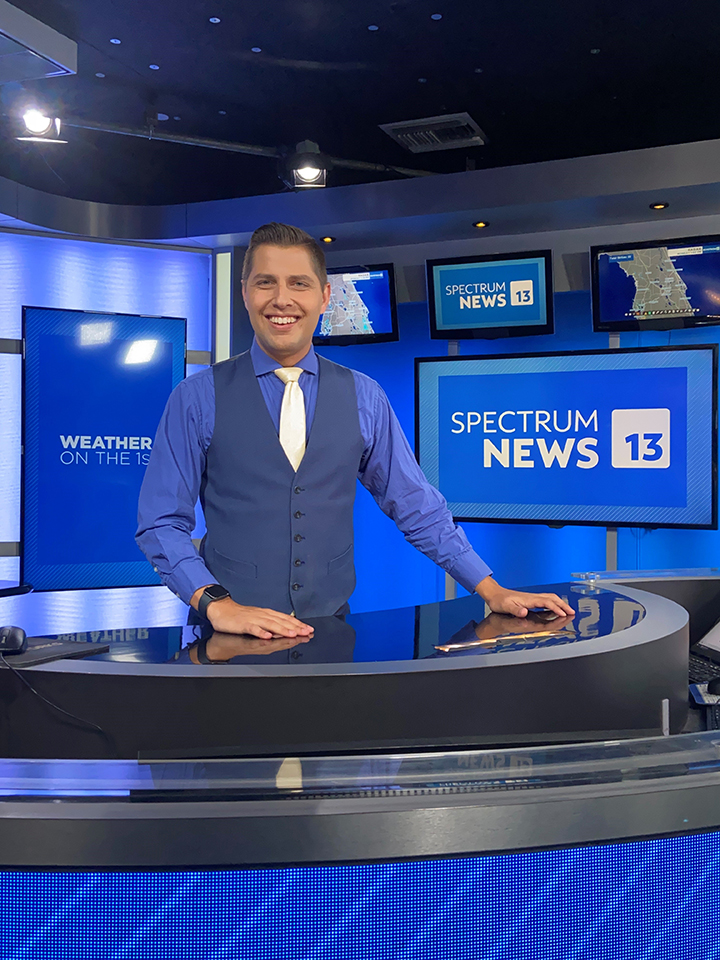From debunking weather myths to forecasting future advancements, seasoned meteorologist Zach Covey with Spectrum News 13 allows us to explore the essential role of meteorologists in our daily lives and how unpredictable Florida weather shapes his intriguing career.
1. What sparked your passion for weather, and how did you get started in this field?
My passion for weather grew from my upbringing as a child. Growing up a military brat, I moved around a lot and traveled around the world; seeing firsthand the different weather and climates really stuck with me. I was especially fascinated by tropical weather and hurricanes.
2. Florida’s weather is known for being both unpredictable and beautiful. How has your experience been working as a meteorologist in this part of the country?
Covering the state of Florida, especially Central Florida, with Spectrum News 13 has been a dream. This state has everything a meteorologist could want— heat and humidity, summertime storms and the tropics. It even has the occasional cold snap or two each winter. Since I started working in this state in 2018, not a day has gone by when I felt I was walking into work, bored by our weather pattern.
3. With Central Florida being a travel destination, what are some common misconceptions about the area’s weather that you’d like to clear up for those visiting or new to the area?
Florida has seasons. We don’t have winter, spring, summer or fall. Instead, we have wet and dry seasons. Dry season is an unofficial term by meteorologists explaining the period that receives the least rainfall during a year. For Central Florida, that’s between October 15 and May 15. The wet season, on the other hand, is where most of our yearly rainfall occurs. It runs the opposite dates – May 15 through October 15. When visiting Florida, dress based on what season we’re in, not the season you’re coming from.
Some also believe in “heat lightning.” It’s not a thing, people; sorry to tell you. Heat and temperature have absolutely nothing to do with the creation of lightning. A long time ago, people used to associate those bolts with temperature and heat, thus the name heat lightning. But further studies and knowledge over the decades have proven that theory wrong. Rather, you’re seeing a strong and bright bolt of lightning from a distant thunderstorm, even though you may not hear the thunder accompanying it due to the distance.
During the heart of Summer in Florida, some thunderstorms can produce lightning strikes seen over 100 miles away. At that distance, the sound of thunder that typically accompanies a lightning strike dwindles out, never reaching our ears. But the brightness of the strike flashes through the night sky.
4. What’s your go-to comfort food on days when the weather is less than ideal?
My mom’s Chicken and Dumplings. Oh, so good! The broth and pieces of chicken warm me up. The doughy goodness of the dumplings is something I could eat all day, every day. But especially during the winter months. That’s easily my go-to comfort food.
5. What has been your proudest moment so far in your years of studying and reporting weather patterns?
Covering the approach, landfall, and aftermath of Hurricane Florence in 2018 when I worked at a station in Myrtle Beach, South Carolina. Hurricane Florence was an extremely powerful Category 4 hurricane that roared toward the Carolina coastline. While Florence wasn’t particularly strong upon landfall, the flooding rains caused the most damage, dumping over 23 inches of rainfall across the state.
I worked 84 hours straight on air alongside my weather team during the entire event. After the event was over, I started hearing from viewers who were sharing their stories with me. People who said I kept them calm when the worst was over their house, others who said I helped save their lives by telling them to evacuate. Those stories have stuck with me, and I continue to reinforce my purpose — to be the calm voice of reason during the worst of mother nature’s wrath. Telling viewers facts without the hype. Those stories prove that I have a duty to provide you with lifesaving information to keep you and those you love safe.
6. What is the most fascinating aspect of weather, and why?
The unpredictability. The atmosphere could be perfect for strong storms to develop, and they won’t. Hurricanes could have all the warm water in the world to intensify, and they still fall apart. The atmosphere, the ocean, and the land are all connected and work as one. If even one thing is off by the slightest fraction, things change. That’s what’s fascinating to me. Weather forecasting has developed quite a bit, but there’s still so much we still need to learn and can’t do. Who knows what we’ll learn or what we may be able to forecast in just the next 10 years!
7. What are some of your favorite hobbies or pastimes outside of work?
Sports are a huge part of my life. From college football to the NHL, I follow sports religiously. Living in Central Florida, it’s a perfect sports market too, and you’ll frequently find me at a Tampa Bay Lightning game or over at Camping World Stadium for a college football bowl game.
Outside of sports, I’m a huge Parks fan. Disney, Universal, you name it. I spend a lot of time at the parks eating park food and riding rollercoasters. I have a dream to one day visit every Disney Park in the world. I only have two more to check off – Hong Kong and Shanghai.
8. What do you love most about living and working in Central Florida?
Central Florida is such a great place for anyone to live. Your age doesn’t matter; you can find things to do for everyone. We have amusement parks, world-class entertainment and sports, and hundreds of miles of beautiful beaches. The culture and food scene are huge in this area. Central Florida will keep me busy for a very long time. I’m so grateful to have that option here.
9. Have you had any funny moments or major mishaps on-air while reporting the weather? Can you share one story?
When I left my last job in West Palm Beach to come here to Central Florida, I left with a unique goodbye. When most people leave a job, some coworkers bring a cake or food for everyone to eat and enjoy together. But not me. I wanted to leave my viewers with a memory they wouldn’t forget.
So, I bought some dry, seasoned crickets and grasshoppers and ate them on air. And I even convinced my co-anchor to join me. We spent the last five minutes of my weekend morning show tasting crickets and grasshoppers on air while we talked about my time at the station and said my final goodbyes. It was such a unique way of saying thank you to everyone for allowing me into their homes while leaving them with a fun memory of me.
And for the record, the grasshoppers were my favorite.
10. Looking ahead to the future of weather forecasting, what developments or advancements do you anticipate seeing in this field within the next few years?
With the advancement of technology over the past several years, it’s no surprise that the emergence of new tech will likely impact the weather industry. AI and machine learning may be at the forefront for us meteorologists. I see machine learning being introduced into computer model simulations by comparing previous forecast model runs and actual observations. Hopefully, this will allow the machine to produce a forecast more accurately in both temporal and spatial resolution. AI also could provide major benefits, from helping to produce timely weather alerts to those on their phones to helping produce weather graphics you’ll see us use on your TV. The future is bright for so many sectors with the birth of new technology, but I think meteorologists will greatly benefit from these new advancements.








Comments